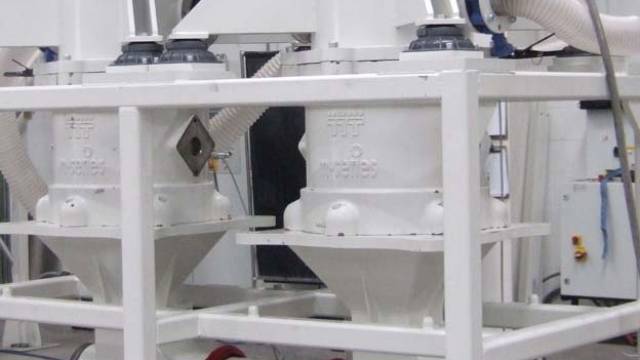International Innovative Technologies Ltd (IIT), based in north-east England, has further developed its patented M-series of high efficiency vertical milling equipment for the high yield conversion of glass and GRP waste into fine powder and other grades of material.
A range of technology upgrades have been incorporated in the latest version of patented low energy milling equipment used for the fine grinding of waste glass, GRP and other hard materials and minerals.
As part of a programme of continuous product improvement, International Innovative Technologies Ltd (IIT) has further developed its patented M-series of high efficiency vertical milling equipment for the high yield conversion of glass and GRP waste into fine powder and other grades of material.
IIT has used the new technology for the successful milling of glass waste to demonstrate the feasibility and cost effective production of powdered glass product for potential use in recycling and industrial applications.
The company’s milling technology is also being used in a GRP manufacturing plant to convert waste GRP into a batch powder, which is re-used as a part of the primary production process. In addition, IIT has recently secured an order with a leading Portuguese manufacturer to convert a glass waste stream into valuable feedstock as part of its production process.
The upgraded system now developed by IIT comes in a range of modular grinding options to meet the needs of different materials, particle size requirements and throughput volumes.
A special new twin mill system configuration, utilizing two grinding modules operating in parallel from a common feed, allows complete flexibility of material throughput and increased production outputs.
In addition, grinding modules can also be arranged vertically in series for multi-stage milling required for the production of certain grades of particularly hard material.
In all configurations, the compact and powerful centrifugal grinding mechanism of the m-series is extremely energy efficient with the vertical material flow path and special roller assembly ensuring that the force produced is translated into maximum particle grinding power.
The second generation mills also incorporate pressurized oil cooling and lubrication for extended bearing life, enhanced sealing integrity and the cooling of critical equipment assemblies. In addition, systems can also be provided with forced air circulation through the mill for product cooling and moisture removal where necessary.
To overcome potential wear problems caused by abrasive materials and to eliminate any contamination problems, the module body is manufactured from heavy duty austempered ductile cast iron and internal wear resistant polyurethane coatings can be incorporated in the inlet and outlet feeds, and a ceramic tile lining used in the grinding module itself.
Across the full range of M-series mills, new engineering design has enhanced the original modular concept of the technology, with simple access, breakdown and reassembly features enabling fast in-line maintenance and replacement of the grinding modules when necessary.
IIT mills and classifiers incorporate electronic control and process monitoring systems developed in collaboration with Siemens Industry Sector. Siemens motors, drives and instrumentation systems form an integral part of the milling and materials processing systems.





